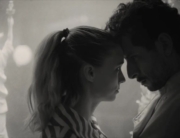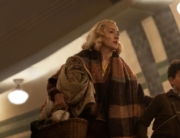Written by Bill Kauffman, based on the novel by Harold Frederic
Released by Brainstorm Media
USA. 120 min. PG-13
With Billy Campbell, Angus MacFadyen, Peter Fonda, Casey Brown & Lucy Boynton
Civil War sesquicentennial celebrations continue to reignite interest in the conflict that divided the nation over the issue of slavery. Examples include reenactments, an endless bibliography of new books on all aspects of the war, and of course, there was the blockbuster film Lincoln. Quite a variety of history lessons.
What is often overlooked in these epic presentations is the impact on families and neighbors who sent young men off to war, many of whom never returned. Songwriter George Frederick Root best described this lingering loss: “There will be one vacant chair.”
Producer Ron Maxwell (Gettysburg and Gods and Generals) leaves behind the battlefields to explore this war at home. Not only is this a tale of families and young men going off to war, it’s about conflicts and differences of opinions that divide communities of lifelong friends. The term “copperhead,” used to label anti-war dissenters, most readily brings to mind Clement Vallandigham, the Ohio Democratic politician who opposed the Lincoln administration’s war. Arrested in May 1863 for giving an anti-war speech, he was convicted by a military commission for committing treasonable sympathy for the enemy. President Lincoln banished Vallandigham to the Confederacy. Anti-war dissenters were found in every state.
Based on a novel written by Harold Frederic in 1893, the film centers on Abner Beech (Billy Campbell), an upstate New York farmer who opposes slavery but also the war and President Lincoln’s war policies. Thus, he’s labeled a copperhead. Beech treasures the ideals of the Declaration of Independence (naming his son after Thomas Jefferson) and the Constitution, especially the right to disagree with the government. His dissent causes discord with his neighbors and even with his own son, who leaves home to join the Union army to impress the father of his girlfriend.
This film contains historical facts referring to battles such as Antietam, the 1864 presidential election, the draft, immigration issues, and the high number of Civil War casualties, but the unusual focus is really on the people of this New York community and how the war impacted them.
The first half feels laborious with its extremely slow pace, although scenes of the beautiful green countryside fill the screen in wide angle shots, complimented with an ever-present musical background. (I was reminded of watching Gettysburg and its overwhelming musical score and wondering how many viewers assumed battles were fought with musical accompaniment.) Reminiscent of Lincoln, dialog is abundant, albeit in a period dialect with appropriate slang. Action, conflict, and resolution fill the second half, with the highlight being a funeral oration. It took a tragedy for the town to recognize the error of their thinking and to accept the place of dissent.
The film mirrors our own time: do we tolerate dissent, especially during a war? And it also reminds us to be ever vigilant for tyranny by the majority. The ideals of democracy are not always easy to abide by. This film puts a human angle on the Civil War and encourages us all to contemplate “the empty chair,” both then and now.

















Leave A Comment